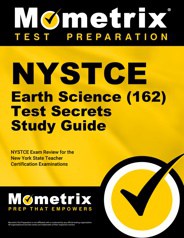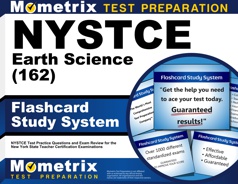The New York State Teacher Certification Exams program (NYSTCE) was designed for teachers in New York State to ensure proficiency in specific educational areas. The NYSTCE Earth Science exam is designed for prospective Earth science teachers in the state of New York.
Click “Start Test” above to take a free NYSTCE Earth Science practice test, and check out our premium-quality NYSTCE test prep resources by clicking the links below!
NYSTCE Earth Science Exam Outline
The NYSTCE Earth Science exam contains 90 selected-response questions and one constructed-response question, and you will be given a time limit of 3 hours and 15 minutes.
The exam is split into six competencies:
1. Space Systems (18 questions)
The questions in this competency are designed to assess your knowledge pertaining to the following:
- Current theories of the origin and evolution of the solar system and universe
- The role of gravity on the position and motion of all objects in the solar system and the universe
- Different types of stars and galaxies
- Determining and inferring the size, proportion, motions, structure, and scale of objects in the solar system and the universe
- The impacts of the relative motions of the Sun, Earth, and Moon on the observed patterns of the phases of the Moon, eclipses, and tides
- The effect of Earth’s revolution and tilt on the seasonal changes
- The celestial sphere model
- The formulation, evolution, and early geologic history of Earth
- The engineering design process as it pertains to space systems
- Planning, constructing, and safely and ethically carrying out investigations about space systems
2. Earth Materials and the History of Earth (18 questions)
The questions in this competency are designed to assess your knowledge and skills pertaining to the following:
- Properties of Earth materials
- Common minerals associated with the major mineral groups
- Characteristics used to classify minerals
- Common rocks
- Major processes that drive the rock cycle
- Earth’s layered structure and composition
- The geologic time scale
- The fossil record
- Relative dating by way of stratigraphy
- The engineering design process as it pertains to Earth materials and the history of Earth
- Planning, constructing, and safely carrying out investigations about the properties of Earth materials and the history of Earth
- Drawing inferences from scientific and technical texts and graphics
- Appropriate resources regarding the safe and proper use of scientific equipment and materials
3. Geologic Systems (18 questions)
The questions in this competency are designed to assess your knowledge and skills pertaining to the following:
- The theory and mechanisms of plate tectonics
- Interactions along plate boundaries
- The causes of earthquakes
- The physical and chemical breakdown of rocks
- The process of soil formation under different climate conditions
- Connections between deposition and erosion
- Models of the cycling of carbon, water, and nitrogen through the atmosphere, lithosphere, hydrosphere, and biosphere
- The engineering design process as it pertains to geologic systems
- Planning, constructing, and safely and ethically carrying out investigations about geologic systems
- Drawing inferences from scientific and technical texts and graphics
3. Water, Weather, and Climate (18 questions)
The questions in this competency are designed to assess your knowledge and skills pertaining to the following:
- The movement of water through the hydrologic cycle
- Characteristics and processes of freshwater systems
- Thermohaline and wind-driven circulation of ocean waters
- The structure, layering, composition, and physical and chemical properties of the atmosphere
- The variables that cause different types of weather
- Weather forecasting
- Variables in the climate system
- Earth’s different climate regions
- Evidence of factors that have caused global temperature changes in the past
- The engineering design process as it pertains to Earth’s water systems, weather, and climate
- Planning, constructing, and safely and ethically carrying out investigations about Earth’s water systems, weather, and climate
- Drawing inferences from scientific and technical texts and graphics
5. Human Impacts and Sustainability (18 questions)
The questions in this competency are designed to assess your knowledge and skills pertaining to the following:
- Availability, use, and management of renewable and nonrenewable natural resources
- The causes and characteristics of different types of natural hazards
- The human impacts on Earth systems
- Data and information on the relationships between Earth systems
- The engineering design process as it pertains to human impacts and sustainability
- Planning, constructing, and safely and ethically carrying out investigations about human impacts and sustainability
5. Pedagogical Content Knowledge (1 question)
For this competency, you will be asked to apply pedagogical knowledge across multiple content domains to design instruction for students, analyze student understanding, and understand how students learn.
Check Out Mometrix's NYSTCE Earth Science Study Guide
Get practice questions, video tutorials, and detailed study lessons
Get Your Study Guide
NYSTCE Earth Science Exam Registration
To register for the NYSTCE Earth Science (162) exam, you will need to create an NYSTCE account online and complete the registration process there. It is recommended that you complete the registration process at least 30 days before you take the exam.
During this process, you will be asked some questions about your educational history, as well as your current education level, first language, matriculation status, and the education code for the NYC Department of Education program type you are associated with.
The examination fee is $122.
Test Day
On test day, you should arrive between 15 and 30 minutes early to allow time for the check-in process. Once you arrive, you will be asked to sign in and provide a valid form of government-issued photo ID. Along with your ID, you are also required to bring your own graphing calculator, as one will not be provided for you.
Before the exam begins, you will be asked to place all personal items in a locker outside the testing room, or you may be asked to leave them in your car.
Once the test begins, you will be allowed to take breaks. However, the timer will not be stopped during your break, so use your break time carefully.
How the NYSTCE Earth Science Exam is Scored
Your total NYSTCE Earth Science score is based on the number of questions you answered correctly, which is then reported as a numerical figure in the range of 400-600. To pass the exam, you must achieve a scaled score of 520.
You should receive your test results roughly 2-4 weeks after taking the exam. When you receive your score report, you will see your total score, your pass/fail status, and your scores for each subarea of the test.
Check Out Mometrix's NYSTCE Earth Science Flashcards
Get complex subjects broken down into easily understandable concepts
Get Your Flashcards
FAQs
Q
How many questions are on the NYSTCE Earth Science exam?
A
There are 91 questions on the exam.
Q
How long is the NYSTCE Earth Science exam?
A
The time limit for the exam is 3 hours and 15 minutes.
Q
What is the passing score for the NYSTCE Earth Science exam?
A
To pass the exam, you must achieve a minimum scaled score of 520.
Q
How much does the NYSTCE Earth Science exam cost?
A
The examination fee is $122.
